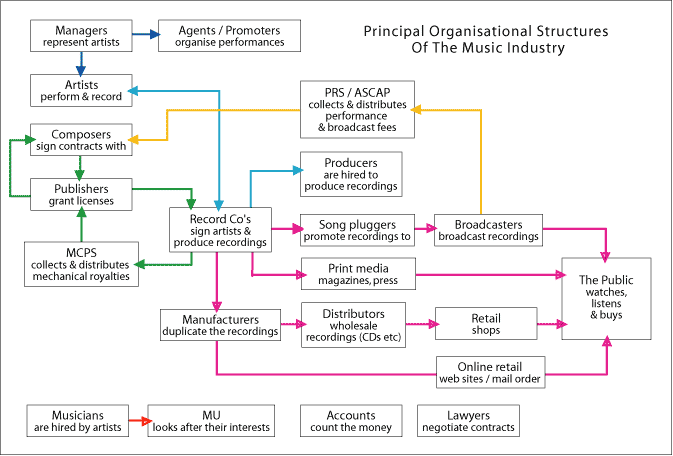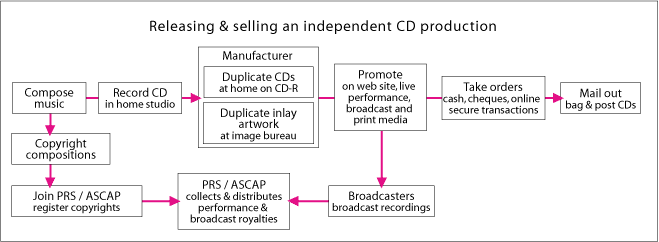This article contains a diagram detailing the principal organisational structures of the music industry together with brief discussions of those organisations which may prove most useful to the independent music maker.
Contact information for the industry organisations discussed here can be found on the Music industry menu.

Artists and composers
A great artist, or star, has a self evident 'talent'. One which can be demonstrated without the need for an arsenal of technological support. Stars can impress with their ability and personal charisma at the drop of a hat. Stars are what the music industry exists for. Everyone else is just bread and butter.
Artists and stars need great songs, and that's where composers come in. A great song can make a composer rich. But defining, let alone composing, a great song has proved elusive to all that have tried. Great songs have an indefinable magic.
Managers
Managers represent artists and composers (record producers too) in their dealings with recording and publishing companies and all other necessary industry bodies. Managers understand the ways and language of the 'music biz' in ways that artists often do not.
Managers will employ, on behalf of their artists, accountants, lawyers, agents, and tour managers and deal with the day to day running of their artists career. In return a manger will typically receive 20% of an artists income. Fact: more managers are turned over by artists then artists are by managers. Managers deal with all of the problems and receive none of the glory.
Production companies
These often comprise an alliance of managers, producers, musicians and composers who cynically 'create' an artist or group with teen appeal and then sell the package to a record company. They are largely responsible for the many 'plastic' and disposable pop acts which come and go. Try to remember, this is light entertainment and nothing to get upset about.
Not all production companies produce 'commercial' product. Many fine artists have emerged from smaller independent organisations created to develop the career of a unique talent who has been 'passed over' by the major record companies.
Publishing companies
A composer assigns their copyrights to a publisher in a so called 'publishing deal'. Publishers license the use of these copyrights to record companies who record them. Every CD manufactured and sold generates a 'mechanical publishing royalty' which is paid by the record company to the MCPS (in the UK) who then pass it on to the publisher who takes a cut and passes the rest to the composer. Typically a publisher will take between 35% and 15% of the royalty depending on their deal with the composer.
A publisher will also try to license their copyrights to film and commercial makers in order to generate as much income as possible.
A composer will benefit in three ways from such a deal.
- Through a structure of foreign offices and sub-publishing deals the publisher will be able to collect royalties on behalf of the composer world wide.
- Should a copyright infringement take place the publisher will have the financial might to sue the pirate on behalf of the composer.
- The publisher will promote and seek additional exploitation of the copyrights thereby generating additional income for the composer.
Record companies
Record companies exist to either facilitate or exploit (according to your point of view) an artists creativity by providing financial and organisational structures to support the recording, manufacture, distribution and promotion of an artists recorded work. In signing a new artist, a record companies financial risk is great. Large sums of money will be invested to support the initial recording, filming and promotional activities that accompany the launch of a new artist.
According to statistics given me by an industry insider two years ago, a certain major company (alright, it was Sony) expected only two out of every ten signings to recoup their initial investments and to make profits long term. Of course these profits can be huge but clearly so is the failure rate. Look at it this way, George Michael financed a good many new artists during his stay at CBS.
It's important to recognise that record companies exist to exploit an artists ability to sell recordings for the benefit of the artist and the company. They do not excel in 'creating' artists. If you are not a performing musical talent in your own right or have not already established a following they will not be interested in you.
Distribution
The success or failure of a CD release is largely determined by a record companies ability to secure exposure on TV, radio and in the print media and then to distribute copies effectively to retail shops. It's no good creating demand for a CD that remains unavailable for sale.
Major record companies have manufacture and distribution structures in place. Without access to these structures through licensing deals, an independently produced CD is unlikely to succeed in the market place. If an independent label manages to generate a high level of broadcast and print media interest in their artists work through effective promotion, it will need to strike a deal with either a major record company or independent distribution company in order to ensure the widespread availability of its CDs in retail outlets.
If you strike a licensing deal with a major record company most of the organisational issues to do with preparing a CD for retail will be handled for you. If your deal is with an independent distribution company you will probably need to do several things yourself before handing over the artwork and CD master.

- Depending on the deal, the distributor may or may not handle the actual manufacturer (pressing and printing) of your CDs. Either way your CDs will need to carry a unique barcode which identifies the CDs in a retail database used by the distributor and shops. Contact the information team at the BPI (British Phonographic Institute) or RIAA (Recording Industry Association of America) for advice.
- During red book CD mastering you may want to enter a 13 digit Media Catalogue barcode which will be encoded with your music data and which provides a unique identifying watermark to help tracking of copyright and royalty rights for commercial retail and distribution purposes. These codes are allocated by the EAN or UPC authorities.
- A reputable CD pressing plant will require you to produce a license issued by the MCPS (Mechanical Copyright Protection Society) in the UK authorising the pressing of your CDs. The MCPS will not give you this license until you have paid to them the 'mechanical royalties' due to the publisher(s) or copyright holders of the compositions on the CD. Clearly this is a grey area. What happens if you are the composer, artist, record company and copyright owner? Do you have to pay yourself to get your CDs pressed? Contact the MCPS for advice in the UK and RIAA in the US.
Retail
Retail is the front line. As an independent music maker you can manufacture and sell your CDs to customers mail order one by one by promoting them in live performance, on your web site and through the print and broadcast media. Eventually on-line delivery will be profitable and secure, but for now we're talking either mail order or retail distribution.
MCPS (Mechanical Copyright protection Society)
In the UK the MCPS exists to oversee the collection and distribution of "mechanical publishing/composer royalties" generated from CD, DVD etc sales. Royalties take the form of a license fee that pays for permission to duplicate a recording. Therefore this fee is normally collected before duplication of a CD, DVD etc, although smaller labels and composers financing their own recordings and selling them can apply for a license that allows them to pay (often themselves!) retrospectively as sales income comes in.
You do not need to have a publishing deal to collect these royalties. You can become a composer-member of the MCPS yourself. However, a publisher will be able to organise collection of your royalties for you world wide.
If you are producing and selling your CDs mail order from home you don't need to register with the MCPS. Do this only when your CDs are available in retail shops.
In the US "mechanicals" are paid directly to the publisher or copyright owner by the record company at a statutory rate (something like 7 cents per song).
PRS (Performing Rights Society)
Music copyrights generate a second lot of royalties when performed or broadcast live. In the UK the PRS exists to collect and distribute these royalties directly to composers. Its counterpart in the US is ASCAP.
Qualification for membership used to depend on having a number of "commercially released" compoistions, but it would appear that this has been abandoned in favour of a joining fee. Contact them for advice.
